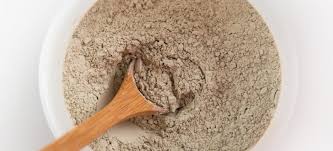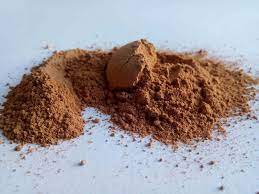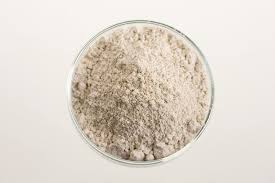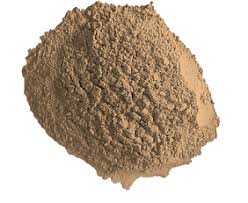RHASSOUL CLAY OR BENTONITE CLAY: WHICH IS BETTER FOR YOUR HAIR?
- Gege The Afro Curly Hair Coach

- Jun 17, 2021
- 5 min read
It’s been proven that clay has enormous benefits for the human hair. It adds thickness and body to your hair, making it fuller, and giving each one of your hair strands a great structure.
Using clay has several other benefits for your hair including drawing impurities and dirt from your hair without stripping your hair of its natural oils; conditioning and moisturizing the hair, controlling frizz; nourishing the scalp and hair with its rich bounty of nutrients and minerals; and stimulating and healing the hair shaft and scalp naturally.
But there is a debate as to whether Rhassoul clay or bentonite clay is best for you hair. The essence of this article is to examine this question and answer it as clearly as possible for you.
First, what is Rhassoul clay?
Rhassoul clay is sometimes called ghassoul clay or Moroccan red clay, so named for where it is naturally found, which is in the Atlas Mountains of Morocco. The word, “rhassoul” actually means “to wash” in Arabic.

The clay is brown in colour and has been used as a cosmetic ingredient for hair and skin use for over a thousand years. It is a stevensite, magnesium-rich clay with a unique blend of mineral composition. The clay has several metallic elements carrying a negative charge, drawing out positively charged toxins and binding to them so that the toxins are washed out of your hair when you wash the clay away. This is the reason rhassoul clay is used as a detoxifier for hair and skin.
Benefits of Rhassoul clay for your hair
Rhassoul clay has silica which is a component of sand. Research shows that natural silica gives hair a glossy sheen and works as an exfoliant for the scalp.

What more, it is able to get rid of the excess oil in the hair, while also cleansing the scalp of other impurities, all these while conditioning and exfoliating the hair to give it volume.
What is bentonite clay?
Bentonite clay has a fine, soft texture, containing natural minerals such as iron, magnesium and calcium. It has been used to remove impurities and toxins from the scalp and skin for thousands of years. The clay is used cosmetically and medically, and is used to treat acne or rashes.

Bentonite clay gets its name from Fort Benton in Wyoming, USA, and is formed from volcanic ash. It is similar in structure to Montmorillonite clay, found in Montmorillon in France.
Bentonite clay is also used to treat oily skin, and it is believed that it is effective because it absorbs dirt and oils from the skin, absorbing such materials by sticking to their ions or molecules. The clay takes the toxin or other molecules with it as it leaves the body.
Benefits of Bentonite clay for your hair
Bentonite clay has several great benefits for your hair. First, it works as a detoxifier and clarifier. It does this by having an anionic (negative) charge, and for this reason attracts cationic charged (positive) products that build up on the scalp and hair. It works similarly to a magnet that draws in product build-up, and so you wash out all build-ups and impurities when you wash the clay out of your hair.

With the product build-up, Bentonite also draws out chemicals, heavy metals and toxins from the hair and scalp. It also has antimicrobial properties and this helps with flaking or irritated scalps.
Additionally, Bentonite clay is said to reduce frizz while moisturizing, conditioning, and softening the hair. It also encourages shine and curl definition.
So, which is better for your hair – Rhassoul clay or Bentonite clay?
Both Rhassoul clay and Bentonite clay are great for drawing out dirt, product build up and toxins from our hair and scalp, and the truth of the matter is that there are very few dissimilarities between them.
Let’s examine these few dissimilarities here:
Bentonite is more absorbent than Rhassoul clay, so if you are looking for extra softness and extra moisture, Bentonite may be the better choice for you. This means is that if your hair goal is softness, you should go for Bentonite clay rather than Rhassoul clay.
One other difference between bentonite and rhassoul clay is that bentonite contains some trace amounts of lead. These trace amounts is not usually a problem for many people, but if you are concerned about lead, even in the tracest amounts, you may want to go for rhassoul clay instead of bentonite clay.
The answer then to “which is better for your hair – Rhassoul clay or Bentonite clay?” is that there is no clear answer to that. There’s no objectively “best” or “better” clay. Your choice of the clay to purchase should be based on your hair and health goals.
If you are looking for softer, more moisturised hair, Bentonite clay should be your choice. And if you are more health conscious than others, Rhassoul clay should be your choice.
How to use clay (Rhassoul or Bentonite) as a hair mask
When you coat your hair in clay, the mask coats your hair in minerals such as magnesium and sulfate. These minerals add softness, shine, and strength to your hair.
All that is required to make your hair mask is water and the clay powder, but you may choose to add other ingredients such as essential oils, rose water or honey.
It is advised that you first read the package instructions of your clay to find out the quantity of water you need to add to make your clay mixture, but from experience, you’ll probably need about two tablespoons of warm water for every one tablespoon of clay powder.
Typically, you’ll need about four tablespoons of clay to go all round your hair, so that amounts to eight tablespoons of warm water.
Mix the two components very well, preferably in a wooden bowl and with a wooden spoon. This is because metal bowls may change the way the charged particles in the clay work.
Part your hair into sections and coat the sections with the mask, using your fingers and beginning from your roots to your hair tips. Make sure that your scalp is completely coated with the mask.
Once done, wear a cap and let the mask soak into your hair for about thirty minutes, after which you wash out the clay with lukewarm water. Make sure you wash everything off. You don’t need to use a shampoo or conditioner afterward although you may choose to.
Risk factors for using clay masks
Clay masks are usually safe for most people, but there are certain people who may not be able to use clay masks. You may fall into this category if you:
Are allergic to to metallic elements like magnesium or aluminium;
If you tend to get eczema, psoriasis or other chronic skin conditions on your scalp. This is because clay masks can dry out or inflame the scalp.
It is also important that you never ingest clay.
The takeaway
The benefits of clay masks for your hair are numerous. We have already discussed how it helps to get rid of dandruff, how it softens, moisturises and conditions the hair, and how it helps to draw out dirt, toxins and product build up from your scalp. We also discussed how clay usage helps you free your hair from frizz while giving it a beautiful shine.
These reasons, in my opinion, are more than enough reasons for you to go get your own very hair mask and start to use it for your hair.
But if you need one more reason to get clay powder, how about this: You can also use it for your skin as a face mask to get benefits ranging from detoxification and purification of the skin, oxygenation of the cells, regulation of sebum production, promotion of softer, smoother and glowing skin, and rejuvenation and regeneration of the skin. It is also known to improve skin tone and is a great anti-bacterial product.
So, why don’t you go ahead and get your very own clay powder? Your life will be better for it.













